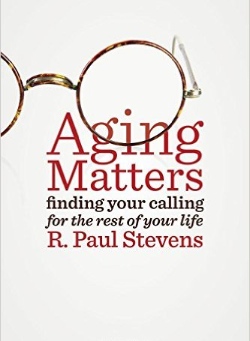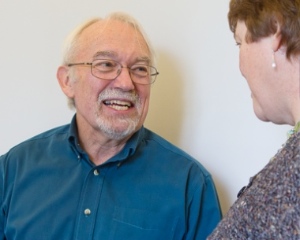The Carey Institute has developed a Centre for Healthy Aging Transitions (CHAT), which will be hosting Transitions of Life: Healthy Aging, Retirement & the Spiritual Journey, this Saturday (February 20), and then a three-part Aging Matters Seminar Series (March 5, April 2, May 7).
Dr. Paul Pearce, director of CHAT, wrote this comment, along with Bethany Mortelliti.
Ageism is the most tolerated prejudice in Canada.
At least, that’s what Revera (a leading housing and care provider for Canadian seniors) and the International Federation on Ageing (IFA) revealed in a 2012 Leger Marketing Poll.
Summarizing the findings of this report, Misty Harris wrote, “Ageism is the most tolerated form of social discrimination in Canada – more so than either gender or race-based prejudices. . . . One third of Canadians admit they’ve treated someone different because of their age, and 63 percent of seniors over 65 say this has happened to them.”[1]
Ageism – that is, discriminating against a person based on their age – is a critical problem in a society where seniors have already outnumbered children as of September 2015.[2]
Without a healthy respect and care for the elderly, our society lacks people to look up to, who model what it means to age well. We further lose the rich resources of lives well lived and the wisdom of people with long life experience. As we disregard and push away people from jobs and do not make time to respond and walk alongside seniors, we slowly lose their contributions to our world.
As Christians in particular, this is a troubling reality to navigate. God has offered to the godly that they would flourish like trees – “Even in old age they will still produce fruit; they will remain vital and green.” (Psalm 92:14).
In other words, seniors – and indeed all of us, who will soon become seniors – have the potential to be fruitful for the whole length of our lives on earth. Yet we quickly believe, with our culture, that everything important happens in the first half of life – that the rest is spent in a lesser capacity, waiting for life to end.
Ageism short circuits our ability to become all that God has intended for us to become.
The church has been presented with a critical opportunity to model being a healthy intergenerational community which challenges ageism.
However, despite the biblical teachings to honour and care for older adults, the church continues to designate the majority of available resources to programs serving those in early to mid-life.
We need a more balanced approach in the next few decades with the growing numbers of older adults already present in our churches and communities. Older adults will also need to recover the value of being an elder (as a maturing and wiser person) in their household, church and community.
The Canadian church is facing an unprecedented time of challenge and opportunity in ministering with/to a rapidly growing number of older adults. We must create opportunities to share the love and hope of Christ through social compassion ministries which care for and support older adults and their families.
Dr. Paul Pearce served as executive director of Beulah Garden Homes in Vancouver until he retired at the end of 2012. He now directs Carey’s Centre for Healthy Aging Transitions.
He points out the course objectives of CHAT’s ‘Aging Matters’ seminar series:
- To understand the process of aging and the challenges and opportunities faced by people in their maturing years (cultural context).
- To gain a biblical and global perspective on how to grow old “in Christ” (theological/historical).
- To develop appropriate spiritual disciplines for the experience of aging (spiritual formation).
- To gain skills in turning the aging population in the church from recipients of ministry to being elders and ministers with the people of God and others (intergenerational model of church life and mission).
- To gain some knowledge and skills in caring for ourselves and others as we face end of life care and choices (pastoral care).
Joining Pearce in leading the seminars (March 5, April 2, May 7) will be Dr. Paul Stevens, professor emeritus of marketplace theology and leadership at Regent College. His mission has always been to empower ordinary people to integrate their faith and life from Monday to Sunday.
 Stevens’ latest book, Aging Matters: Finding Your Calling for the Rest of Your Life, is due out in March. The publisher (Eerdmans) has this to say:
Stevens’ latest book, Aging Matters: Finding Your Calling for the Rest of Your Life, is due out in March. The publisher (Eerdmans) has this to say:
Vocational discernment, says R. Paul Stevens, is a lifelong process and it takes on even more significance in later life. In Aging Matters, Stevens argues that our calling does not end with formal retirement; to the contrary, he maintains that we do well to keep on working, if possible, till life’s end.
Bethany Mortelliti is assistant to the vice president of Carey Institute.
[1] Harris, Misty. “Ageism is most tolerated social prejudice in Canada, poll find.” The Vancouver Sun Online. November 2, 2012. http://www.vancouversun.com/health/Ageism+most+tolerated+social+prejudice+Canada+poll+finds/7490281/story.html
[2] Andrew-Gee, Eric. “Canada shows its age as seniors outnumber children for first time.” The Globe and Mail Online. September 30, 2015 http://www.theglobeandmail.com/news/national/canada-shows-its-age-as-seniors-outnumber-children-for-first-time/article26595171/

